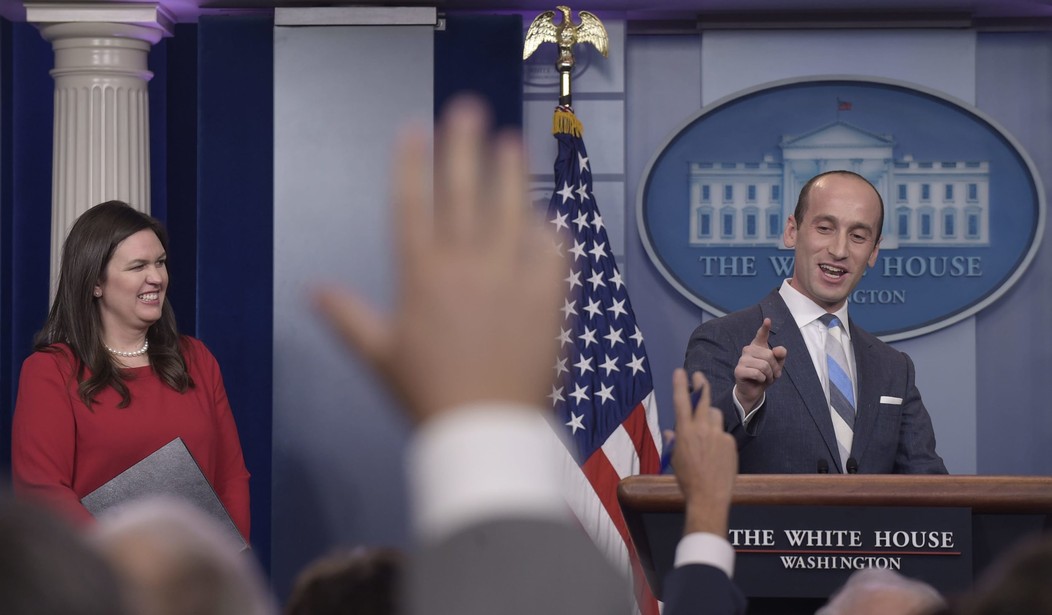WASHINGTON — The Trump administration rolled out a legislative plan today to shift the green-card system to a points-based ranking that President Trump argued will push low-skilled, low-wage immigrant workers to the bottom of the pile, a proposal that quickly drew opposition from a GOP senator who said it would hurt his state.
President Trump unveiled the Reforming American Immigration for a Strong Economy (RAISE) Act with sponsors Sens. Tom Cotton (R-Ark.) and David Perdue (R-Ga.) at the White House today.
“This competitive application process will favor applicants who can speak English, financially support themselves and their families, and demonstrate skills that will contribute to our economy,” Trump said. “The RAISE Act prevents new migrants and new immigrants from collecting welfare and protects U.S. workers from being displaced. And that’s a very big thing. They’re not going to come in and just immediately go and collect welfare. That doesn’t happen under the RAISE Act. They can’t do that.”
He added that green card reforms would translate into pay raises for American workers.
“Only one in 15 out of a million new immigrants [annually] come here because of their job skills and their ability to succeed in this economy,” Cotton said. “…Now for some people, they may think that that’s a symbol of America’s virtue and generosity. I think it’s a symbol that we’re not committed to working-class Americans.”
Perdue said the goals of the U.S. immigration system “should be to protect the interests of working Americans, including immigrants, and to welcome talented individuals who come here legally and want to work and make a better life for themselves.”
At the daily White House briefing, senior advisor Stephen Miller was asked about the chances of the bill succeeding in Congress. “The more that we, as a country, have a national conversation about what kind of immigration system we want and to whom we want to give green cards to, the more unstoppable the momentum for something like this becomes,” he replied.
“Ultimately, members of Congress will have a choice to make,” he added. “They can either vote with the interests of U.S. citizens and U.S. workers, or they can vote against their interests, and whatever happens as a result of that I think would be somewhat predictable…. The numbers are too large, and the numbers of low-skilled workers, in particular, is a major detriment to U.S. workers.”
The Department of Homeland Security announced two weeks ago a hike in visas for temporary non-agricultural workers for businesses that can prove they’d suffer “irreparable” financial harm without the immigrant labor. Trump received 69 H2-B visas for foreign workers at his Mar-a-Lago resort in 2016, according to the Palm Beach Post.
Miller said that was different from the green card legislation. “If you go back and look at [Trump’s] debate on this during the primary, where he said, ‘As a businessman, my responsibility is to operate my business according to the laws of the United States as they exist.’ He said, ‘As president, my responsibility is to pass laws that make sure we have an immigration system that prioritizes American workers,'” he explained.
Sen. Lindsey Graham (R-S.C.) tweeted that he’s “always supported merit-based immigration. I think we should always want to attract the best and brightest to the United States.”
“Unfortunately other part of proposal reduces legal immigration by half including many immigrants who work legally in Ag, tourism, & service. SC #1 industry is Ag. Tourism #2. If proposal were to become law… devastating to SC economy which relies on this immigrant workforce,” he added.
Miller tangled with CNN’s Jim Acosta at the end of his briefing when Acosta asked if the president’s proposal is “in keeping with American tradition when it comes to immigration.”
“The Statue of Liberty says, ‘Give me your tired, your poor, your huddled masses yearning to breathe free.’ It doesn’t say anything about speaking English or being able to be a computer programmer,” Acosta asked. “Aren’t you trying to change what it means to be an immigrant coming into this country, if you’re telling them, ‘You have to speak English’? Can’t people learn how to speak English when they get here?”
“Well, first of all, right now it’s a requirement that to be naturalized, you have to speak English. So the notion that speaking English wouldn’t be a part of immigration systems would be, actually, very ahistorical,” Miller replied. “Secondly, I don’t want to get off into a whole thing about history, here, but the Statue of Liberty is a symbol of liberty enlightening the world. It’s a symbol of American liberty enlightening the world. The poem that you’re referring to was added later. It’s not actually part of the original Statue of Liberty.”
Acosta asked if the English-knowledge aspect of the bill meant the U.S. is “just going to bring in people from Great Britain and Australia.”
“Jim, have you honestly never met an immigrant from another country who speaks English, outside of Great Britain and Australia? Is that your personal experience?” Miller replied to Acosta, the son of a Cuban immigrant.
“This sounds like you’re trying to engineer the racial and ethnic flow of people into this country through policy,” Acosta countered.
Miller called it “one of the most outrageous, insulting, ignorant and foolish things you’ve ever said.”









Join the conversation as a VIP Member